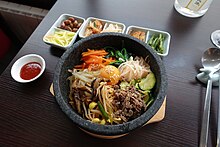Dolsot
| Dolsot / Gopdolsot | |
 Dolsot-bibimbap, bibimbap served in a dolsot | |
| Korean name | |
|---|---|
| Hangul | 돌솥 |
| Revised Romanization | dolsot |
| McCune–Reischauer | tolsot |
| IPA | [tol.sot̚] |
| Hangul | 곱돌솥 |
| Revised Romanization | gopdolsot |
| McCune–Reischauer | koptolsot |
| IPA | [kop̚.t͈ol.sot̚] |
A dolsot (돌솥; lit. "stone pot") or gopdolsot (곱돌솥; lit. "agalmatolite pot") is a small-sized cookware-cum-serveware made of agalmatolite, suitable for one to two servings of bap (cooked rice).[1][2][3] In Korean cuisine, various hot rice dishes such as bibimbap or gulbap (oyster rice) as well as plain white rice can be prepared and served in dolsot. As a dolsot does not cool off as soon as removed from the stove, rice continues to cook and arrives at the table still sizzling.[4]
On the bottom of dolsot, there forms a thin crust of scorched rice, to be scraped off and eaten in case of bibimbap, or made into sungnyung (infusion) in case of unseasoned rice dishes. In the former case dolsot can be brushed with sesame oil beforehand to facilitate scraping.[4] To make sungnyung, the unscorched part of rice is scooped and transferred into another serving bowl right after served, and hot water or tea (usually mild grain teas such as barley tea or corn tea)[5] is poured into the dolsot when it is still blistering. The infusion with loosened chunks of scorched rice remains warm til the end of the meal, when it is typically savoured.
Gallery
-
Bap (rice) cooked and served in dolsot
-
Gulbap (oyster rice) in dolsot
-
Yukhoe-bibimbap (beef tartare bibimbap) in dolsot
-
Dolsot in a wood container to prevent injury caused by the heat
See also
References
- ^ "dolsot" 돌솥. Standard Korean Language Dictionary (in Korean). National Institute of Korean Language. Retrieved 1 March 2017.
- ^ "gopdolsot" 곱돌솥. Standard Korean Language Dictionary (in Korean). National Institute of Korean Language. Retrieved 1 March 2017.
- ^ "gopdolsot" 곱돌솥 [agalmatolite pot]. Doopedia (in Korean). Doosan Corporation. Retrieved 1 March 2017.
- ^ a b Potter, Claire (18 November 2013). "Bibimbap: the ultimate comfort food". The Guardian. Retrieved 1 March 2017.
- ^ Schumer, Fran (18 February 2016). "Review: At So Kong Dong, Korean Soups Bring Two Kinds of Heat". The New York Times. Retrieved 1 March 2017.



